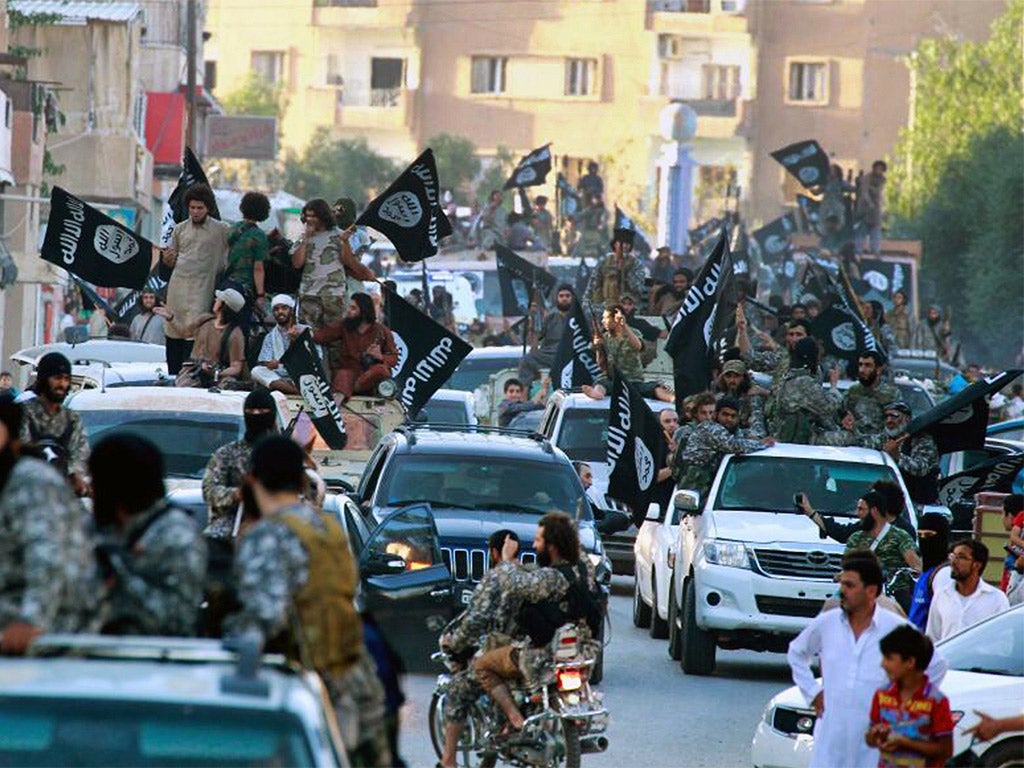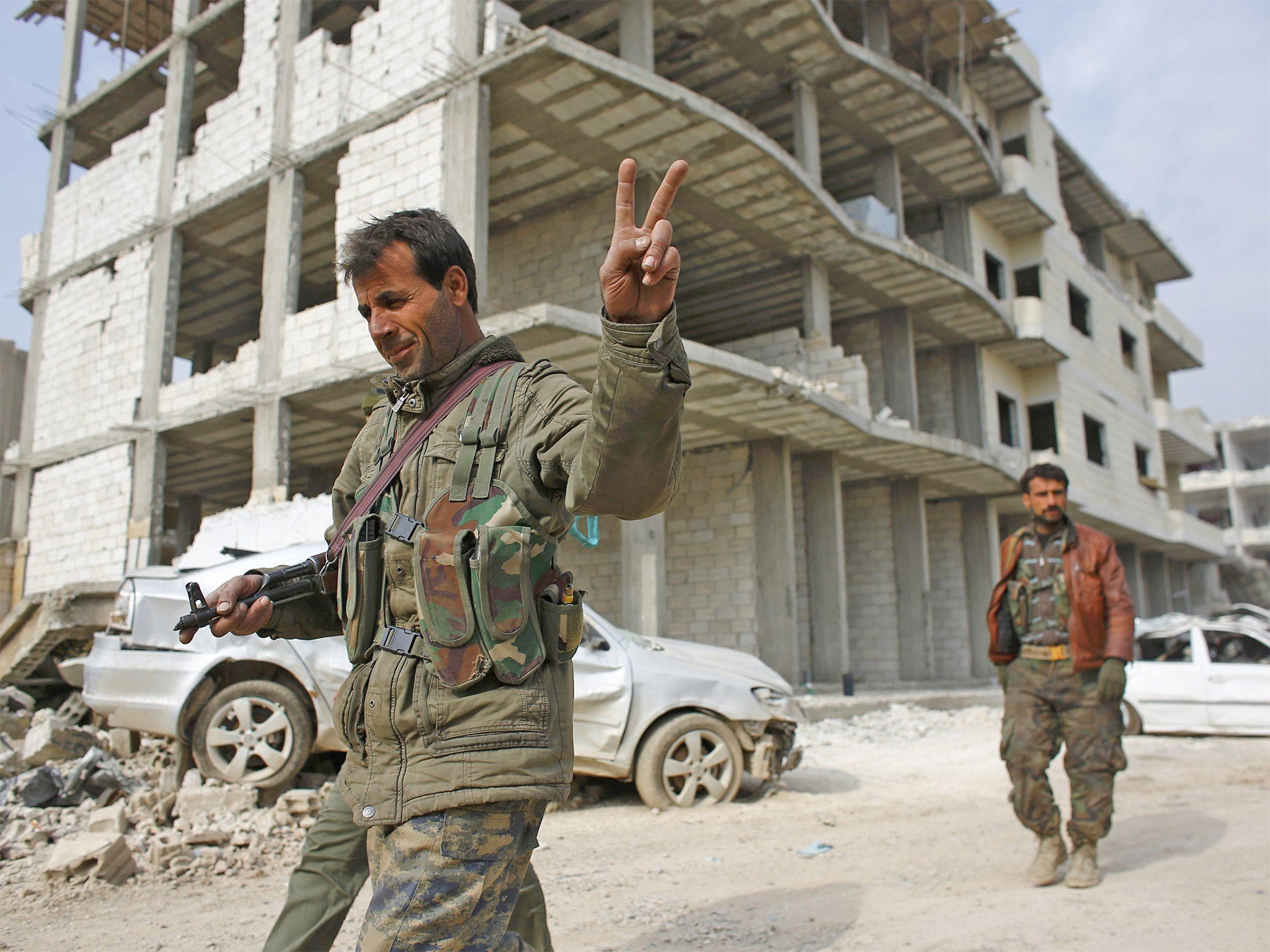Syria civil war: Isis could soon lose access to the outside world as Kurds target key river crossing
Events will go on being shaped by action on the battlefield rather than diplomacy, says Patrick Cockburn in Erbil

Your support helps us to tell the story
From reproductive rights to climate change to Big Tech, The Independent is on the ground when the story is developing. Whether it's investigating the financials of Elon Musk's pro-Trump PAC or producing our latest documentary, 'The A Word', which shines a light on the American women fighting for reproductive rights, we know how important it is to parse out the facts from the messaging.
At such a critical moment in US history, we need reporters on the ground. Your donation allows us to keep sending journalists to speak to both sides of the story.
The Independent is trusted by Americans across the entire political spectrum. And unlike many other quality news outlets, we choose not to lock Americans out of our reporting and analysis with paywalls. We believe quality journalism should be available to everyone, paid for by those who can afford it.
Your support makes all the difference.The inability of Presidents Obama and Putin to reach any agreement on how to tackle the conflict in Syria is good news for Isis. Its survival and expansion over the past 18 months has depended largely on the disunity and rivalry of its many enemies. This looks likely to continue.
Events in Syria and Iraq will go on being shaped by events on the battlefield rather than diplomacy with the self-declared caliphate being squeezed in some areas, but capable of making advances in others. The only serious reverses suffered by Isis since its successful campaigns in the summer of 2014 have been at the hands of the Kurds in Iraq and Syria.

The Iraqi Kurds have taken back most of the territory they lost then, but are not likely to advance further into Arab majority areas. More seriously for Isis, the Syrian Kurds defeated its fighters with US air support at Kobani and now control all but one of the border crossings with Turkey.
Kurdish leaders say they will seek to seize this last crossing at Jarabulus on the Euphrates before the end of the year, thereby isolating Isis from the outside world.
Isis remains capable of launching offensives, despite being targeted by some 7,000 air strikes by a US-led coalition over the past year. Though the Kurds in northern Iraq and northern Syria have advanced, the Syrian and Iraqi armies have both failed to launch successful counter-attacks.
Isis fighters captured Fallujah 60 miles west of Baghdad in January 2014 and, despite the opposition of the US, Iran and many other states, they still hold it. This lack of pressure on Isis in Iraq frees up forces to fight in Syria and is a more important military development than France joining, and Britain planning to join, the US-led air campaign against Isis in Syria.
Isis has made headway against the Syrian army, capturing Palmyra on 22 May and getting uncomfortably close to the main M5 north-south highway linking Damascus to the north of the country.
Nevertheless, the militants probably do not have the strength to take the capital, Homs, Hama or the government’s half of Aleppo.
Russia, Iran, Iraq and Hezbollah of Lebanon all have too much to lose to allow Isis and the al-Qaeda type groups to overthrow President Bashar al-Assad. To the alarm of the Americans, the Iraqi government, Iran and Russia signed an agreement last weekend to share intelligence.
Despite continued differences with the US, Russia has already regained something of its old status as a great power as a result of the Syrian crisis. Iran and Iraq, the two biggest Shia majority countries, are also making clear that they will do everything then can to prevent an extremist Sunni victory in Syria.
For the moment there is a military stalemate in both Iraq and Syria, but Isis could soon lose its access to the outside world. Its militarily most effective opponents are the Syrian Kurds and their People’s Protection Units (YPG) which Amina Ossi, Deputy Minister of Foreign Affairs for the biggest Kurdish enclave, says “number about 50,000 fighters, in addition to 3,000 killed in the fighting”.
"We are thinking only of liberating the area between Kobani and Afrin and making Rojava [the Syrian Kurdish region] one entity"
The figure for the YPG fighters sounds high, but it has inflicted serious defeats on Isis at Kobani, Hasaka and Tal Abyad this year. This has led to a furious reaction by Turkey, suspected of tolerating or support Isis activities in the past, which sees half its 550-mile long southern frontier under the control of the Syrian Kurds. Worse, from a Turkish point of view, the ruling Democratic Union Party (PYD) and the YPG are essentially the Syrian branch of the Kurdistan Workers Party (PKK) of Turkey which has been battling the Turkish state since 1984. On Tuesday, the Turkish government said it had killed 30 Kurdish fighters in clashes along the southern border with Iraq.
It would be difficult to imagine a more disastrous outcome to the Syrian conflict for Turkey than the creation on its southern flank of a well-armed Syrian Kurdish state-let ruled by the PKK and allied militarily to the US.
The Syrian Kurdish leadership is now considering a further advance west of the Euphrates to take Isis’s last border crossing with Turkey at Jarabulus and to link up with a Kurdish enclave at Afrin. Sihanouk Dibo, an adviser to the Syrian Kurdish leader Saleh Muslim, told The Independent in an interview in Qamishli, the Syrian Kurdish capital, that “we are thinking only of liberating the area between Kobani and Afrin and making Rojava [the Syrian Kurdish region] one entity”.
This would be a bad blow to Isis and the al-Qaeda clones in the area, but it might also provoke a Turkish invasion. Conflict in Syria is still spreading instability throughout the region.
Join our commenting forum
Join thought-provoking conversations, follow other Independent readers and see their replies
Comments